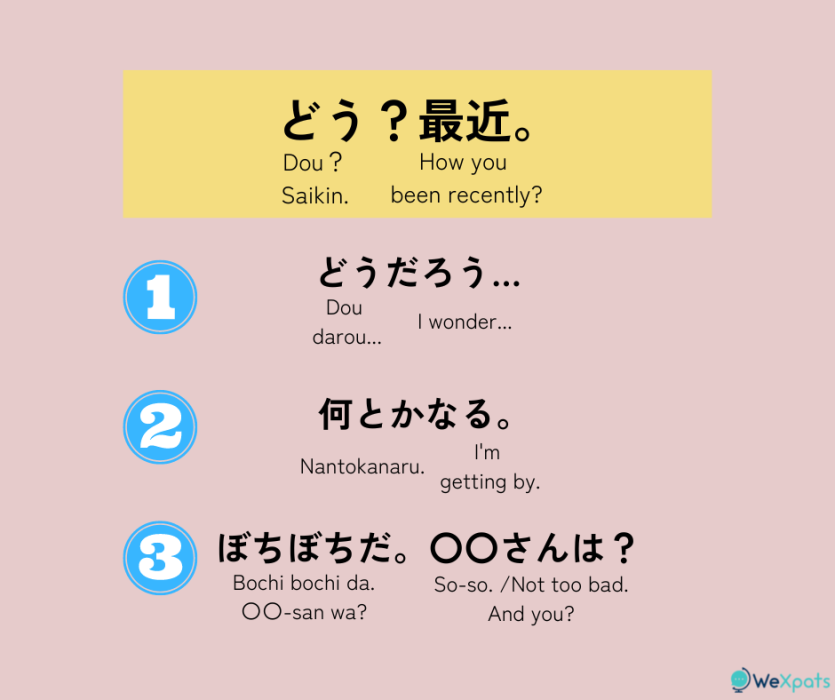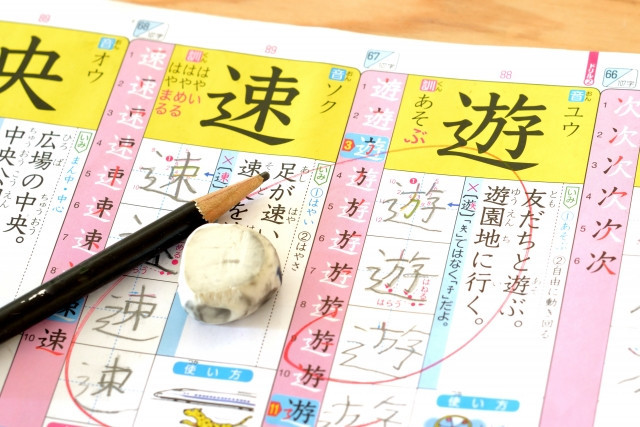Want to ask “how are you” in Japanese but don’t know how? In this article, we introduce 25 ways to ask someone how they are doing in Japanese. Some are for formal situations, and some between close friends, so pay attention! We also introduce Japanese greetings that go great as a set to your question.
Table of Contents
Here are 25 ways to ask “How are you?” in Japanese.Some are best suited for formal occasions, and some for casual occasions, so look out!
1. 元気?
Genki?
Genki (元気) means healthy, lively, or spirited. This is a super casual way of talking so only use it with friends. Use an upward inflection when saying “-ki” to make it clear it's a question - question tone.
2. お元気ですか?
Ogenki desu ka?
The Japanese textbook version of “How are you?”, and a common phrase taught in beginner’s Japanese lessons. It is a polite form and suitable to use with acquaintances, strangers, and older people.

3.元気だった?
Genki datta?
“-Ta” form is the Japanese version of past tense. So「元気だった」is asking “how have you been?”. This is the casual form so only used with friends.
4. お元気でしたか?
Ogenki deshita ka?
Using the “-desu” form, this is the polite version of “how have you been?”. It can be used with acquaintances, strangers, and older people.
Writer's Pick
5. 最近はどう?
Saikin wa dou?
Saikin (最近) means recently, lately, or nowadays, so this question means “how are you recently?”. You can drop the “wa” to make it「最近はどう saikin dou」. This is a casual way of asking. A questioning tone should be used.
6. 最近はどうですか?
Saikin wa dou desu ka?
The same meaning as above but in polite form with the addition of “-desu”. It is also clearly a question with “-ka” at the end.
7. 最近はいかがですか?
Saikin wa ikaga desu ka?
An even more politer version with “ikaga” instead of “dou”. Both “ikaga” and “dou” means “how”, but “ikaga” is considered as keigo, aka business Japanese. This is used in formal situations or when speaking to someone of higher status than yourself, for example a customer or a superior.
8. 最近何か変わったの?
Saikin nani ka kawatta no?
“Anything changed recently?” or “anything new?” is what this means. The former meaning is a more literal translation as “kawatta (変わった)” means changed (note the past tense -ta form). Another way of saying this is,
「最近なんか変わったことある?」
Saikin nanka kawatta koto aru?
9. どう?最近。
Dou? Saikin.
Same level of casualty as “saikin dou? (最近どう?)” with just the words flipped around. Still, this is probably the most common way friends ask each other how they are doing recently in Japan, especially when coincidentally passing by each other on the streets.

10. 調子はどう?
Choushi wa dou?
This means “how are things going?”, with choushi (調子) meaning condition. Change it to -desu form to make it more polite like so, 「調子はどうですか? choushi wa dou desu ka?」, or even formal like so, 「調子はいかがですか?choushi wa ikaga desu ka?」.
This should only be used when there is implied context or understanding of a situation. For example,
-
When a superior at work asks a subordinate, it implies “how is work going?”.
-
When someone is sick or has been sick for a while, it implies “how is your health?”
-
When you know someone is facing a particular problem, it implies “how is that problem going?”
and so on.
11. 体調はどう?
Taichou wa dou?
Taichou (体調) means physicial health or body condition. A different way to say taichou is “karada no choushi (体の調子)”. It means “how is your health?” and is used for a specific condition, namely when someone you know is sick, frequently sick, or has been sick for a while. Unlike “choushi”, there is no ambiguity about what you are asking about.
12. 気分はどう?
Kibun wa dou?
Kibun (気分) means feeling or mood, there is a Japanese phrase「気分転換 kibun tenkan」which means change of pace but can also mean to take a mental break. This is for asking someone how they are feeling. When asking this question, you are referring to their emotional state as opposed to physical being.
13. 大丈夫?
Daijobu?
Daijobu (大丈夫) means alright or okay, so when you ask someone “daijobu?”, you are asking “are you okay?” or “are you alright?”. It can be attached to other words to ask specific questions. For example
-
adding “karada (体)” meaning body will be asking about someone’s health -「体大丈夫?karada daijobu?」
-
adding “shigoto (仕事)” meaning work will be asking about someone’s work -「仕事大丈夫?shigoto daijobu」
This is the casual version so only use with friends. Also remember to use the questioning tone.
14. 大丈夫ですか?
Daijobu desu ka?
The polite version of “daijobu?” that means “are you alright?”. When attaching other words to ask specific questions, it is best to transform those words into “polite versions” as well.
-
“Karada (体)” becaomes “okarada (お体)” - 「お体は大丈夫ですか?okarada wa daijobu desu ka?」
-
“Shigoto (仕事)” becomes “oshigoto (お仕事)” -「お仕事は大丈夫ですか?oshigoto wa daijobu desu ka?」
Note that the “wa” can be dropped.
15. 大丈夫そ?
Daijobuso?
Daijobu (大丈夫?) was lengthened to “daijoubu sou? (大丈夫そう?)", but then shortened to "daijobu so? (大丈夫そ?)" in a recent trend.
You can read more about Japanese slang words here:
16. どうしたの?
Doushita no?
“What’s wrong?” or “What happened?”, this is used to ask how you are in Japanese but in bad situations. For example, when a friend or close colleague looks worried or troubled about something. You can also choose to drop the “no” at the end to make it even more casual.

17. どうしたんですか?
Doushitan desu ka?
“-Desu” form of the immediate above, this is the polite version you can use with not as close colleagues, acquaintances, strangers, etc.
18. どうかしましたか?
Douka shimashita ka?
This is easily confused with「どうしたの?・どうしたんですか?」even among Japanese people. The difference is that “doushita no?” and “doushitan desu ka?” is when you sense something bad happened, so you’re asking specifically what bad thing happened - “what happened?”.
On the other hand, “douka shimashita ka?”, is when you sense something bad happened but not asking “what (bad thing happened?” but indirectly “did something happen?”. It is better to ask this if you are not sure about the situation.
19. どんな感じ?
Donna kanji?
“Kanji (感じ)” means feeling, so asking someone this is like asking “how do you feel?” which is another variation of asking how are you in Japanese. It is also frequently used attached with a subject like so「~どんな感じ」to ask how something was.

20. 何してる?
Nani shiteru?
“What are you up to?” or “what are you doing?” is a casual indirect way to ask “how are you?” between friends.
21. 面白いことあった?
Omoshiroi koto atta?
A great way to start a conversation on a positive note, and also to catch up on recent news with friends. It means “anything interesting happened?” or “any good news?”.
22. それから何かあった?
Sorekara nani ka atta?
This means “has anything happened since then?” and is a casual way to catch up with friends on recent events. Depending on your last conversation with the person, there may be implied context. For example, the last time you spoke your friend was having problems at work so asking this question, you’ll be asking “how have things been since then?”.
23. お変わりありませんか?
Okawari arimasen ka?
“Kawaru (変わる)” means change. This question is asking “any changes?”. It is the polite and formal version of「それから何かあった?sore kara nani ka atta?」. It is suitable to use even in business conversations.

24. いかがお過ごしでしょうか?
Ikaga osugoshi deshou ka?
A formal version of asking someone “how are you doing?”. Also, suitable to use in a business context. You can also add “gobusata shite orimasu ga” to the front.
25. ごきげんよう
Gokigenyou
A very rarely used greeting, I doubt many people have heard it even when living in Japan. It translates to “how do you do?” but can also mean “greetings”. It is more commonly used in private girls’ schools and upper class people, and is considered an “anime phrase” to many people.
Greetings Before Asking How Are You in Japanese

Asking someone “how are you?” immediately can come across as unnatural. In most cases, people will say a greeting first. Here are some common ones used in Japan as well as situations they are usually used in.
久しぶり
Hisashiburi
Means “long time no see”, or change it to “Ohisahiburi desu (お久しぶりです)” to make it more formal. Follow up with any of the “how are you” above, keeping in mind to match casual with casual, and formal with formal to make it natural.
ご無沙汰しております
Gobusata shite orimasu
The most formal form of “long time no see”. Usually used when talking to superiors and people with high status.
お疲れ様です
Otsukaresama desu
A greeting between coworkers. Also, used at the end of a work day to say goodbye.
おっす・どうも・よっ ・やぁ
Ossu / Doumo / Yo / Yaa
These 4 are very, very casual ways of saying “hi” or “hey” so only use them with close friends! Follow up with a casual “how are you”. The latter “Yo” and Yaa” are more commonly used by men.
To Close

Now that you’ve learnt the many ways to say how are you in Japanese, and in different contexts, go forth and practice your Japanese speaking skills. We also have other articles about Japanese conversation so please check them out.



































